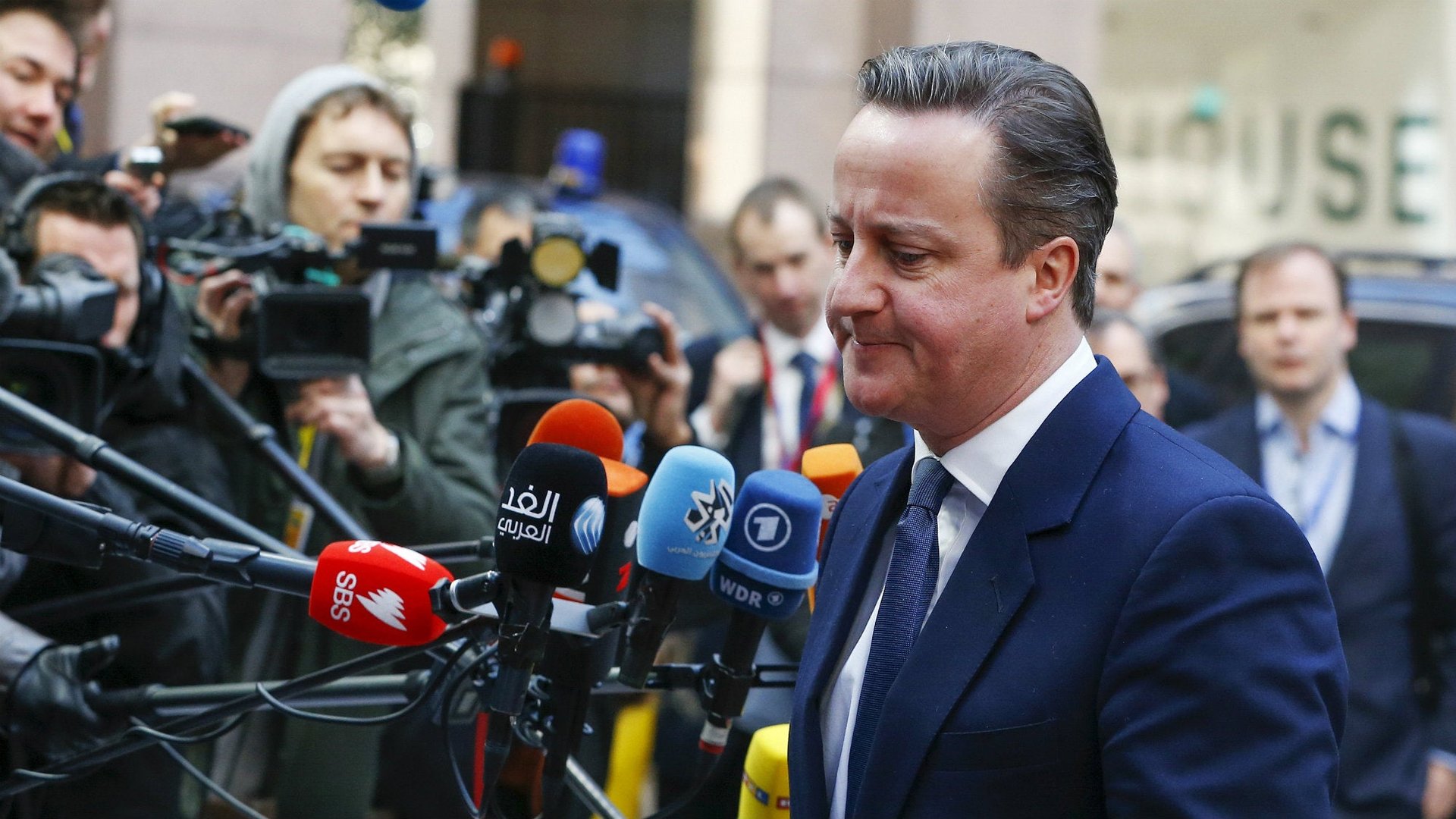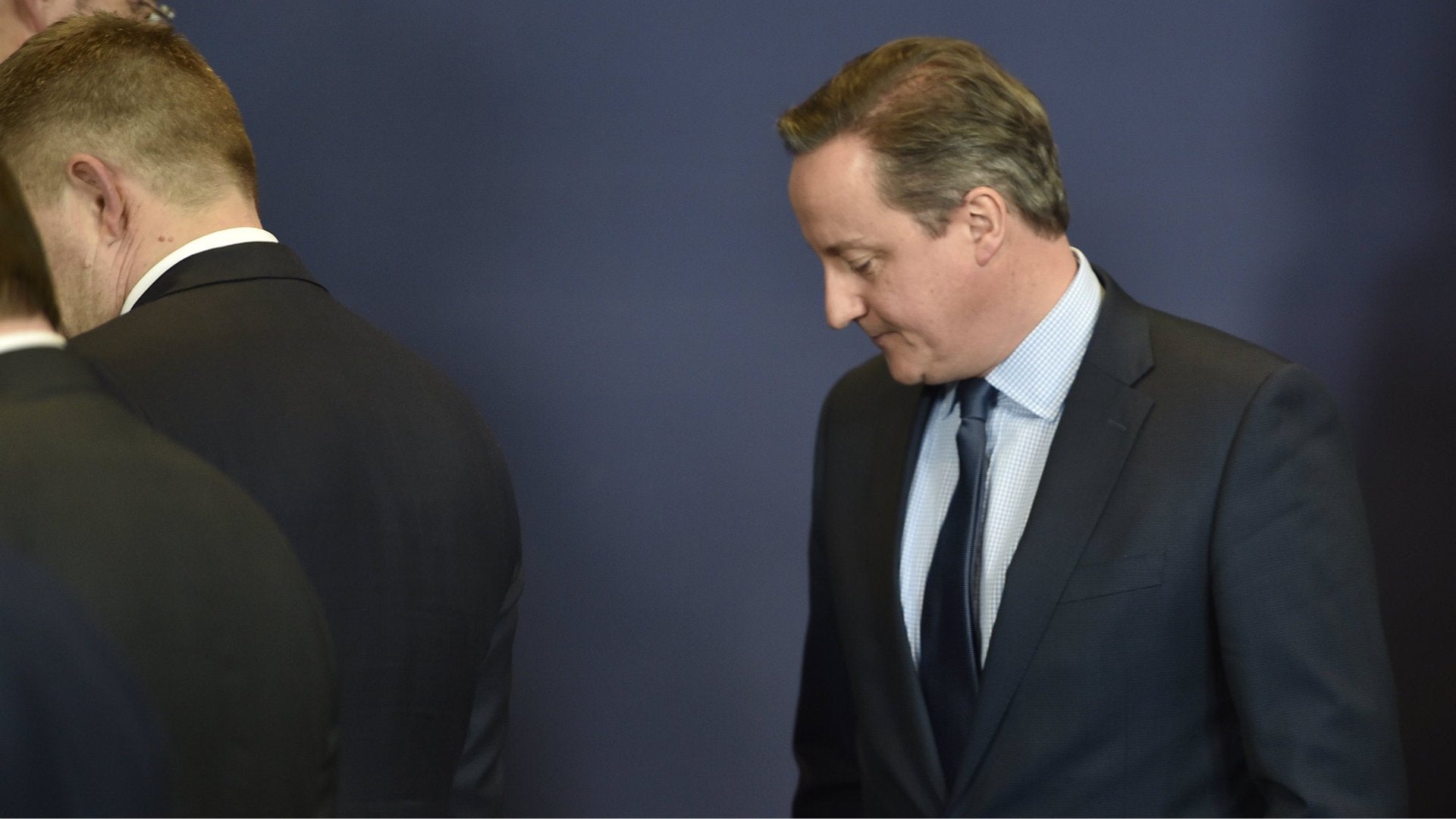What does Britain want? Nobody really knows
In the 1960s, when Britain applied to join the European Economic Community, a predecessor of today’s European Union, it was vetoed by France. Twice.


In the 1960s, when Britain applied to join the European Economic Community, a predecessor of today’s European Union, it was vetoed by France. Twice.
The UK made it into the club, eventually, in 1973. Shortly thereafter, new prime minister Harold Wilson called a referendum on whether Britain should remain a member. It wasn’t close—two-thirds of voters opted to stay in the club on June 6, 1975.
Belying its initial enthusiasm, Britain has been an awkward member of the economic bloc ever since, reluctantly pulled along as the EU has expanded to 28 countries, of which 19 now also share the same currency, the euro. Some 40 years after Wilson’s referendum, another prime minister, David Cameron, is now fulfilling his own pre-election pledge by calling a vote on continued membership in the bloc. Today he set the date for it: June 23.
It is shaping up to be a much closer contest this time around. Brits could veto their own membership in the club—a British exit, or Brexit—reorienting the bloc around a Franco-German core, as it was at the beginning.
Negotiating on the brink
Cameron says that it’s “vital to keep Britain in a reformed EU.” To that end, he insisted on reforms that he could sell to voters back home. Those were agreed at a summit with fellow European leaders in Brussels that wrapped up late yesterday (Feb. 19). If Britain nonetheless votes in June to leave the EU, it could cost Cameron his job, making the referendum a high-risk move for a prime minister who has already survived one risky vote (on Scotland staying in the UK) and later romped to victory in an election less than a year ago.
The two days of talks in Brussels were thus pitched as a momentous, last-ditch, do-or-die attempt to save the EU as we know it. But then again, these meetings always are. The contours of the reforms demanded by the UK were mostly worked out weeks ago, with a handful of details left to be filled in by leaders at the summit.
Following the usual script, leaders talked tough before the negotiations, often using military metaphors—”I’ll be battling for Britain,” Cameron said as he arrived at the summit. The talks then dragged on long enough to be described as a “marathon,” and provided ample opportunity for a steady stream of leaks and briefings to suggest that things could break down at any moment. (It couldn’t have been that intense, given that German chancellor Angela Merkel, the EU’s top power broker, found time during the talks to step out and sample some of Brussels’ famous frites.)
Eventually, the leaders emerged, shortly before midnight, to declare that their deft dealmaking skills had secured a famous victory for whatever position they support. “We’ll be in the parts of Europe that work for us… and we’ll be out of the parts of Europe that don’t work for us,” Cameron said in a statement. It is “the best of both worlds,” he stressed.
The summit’s conclusions, written in the dense legalese at which the EU excels, will now be presented to a public that cares more about this week’s changes to the voting process for the Eurovision song contest than about reforms to the political and economic union that has governed much of their daily life for decades.
Lithuanian president Dalia Grybauskaite knows the score: “Everybody will have their own drama and then we’ll agree,” she said at the start of the summit. At its conclusion, she duly tweeted:
And so it went. What happened, exactly?
Let’s make a deal
Broadly speaking, these are the reforms that Cameron won in Brussels:
- Restrictions to welfare benefits offered to migrants from other EU countries (some of which are rarely used)
- A new means for national parliaments to block EU policy proposals (a milder form of which already exists, and is also rarely used)
- A procedure by which a non-euro-zone country can slow the passage of financial regulations in the euro zone that may put it at a disadvantage (important, but difficult to explain to the casual observer)
- A British opt-out from the EU founding treaty’s ambition for an “ever closer union” (symbolic, but semantic)
- A pledge by by the EU to ”boost its international competitiveness” (possibly the least controversial declaration ever)
The UK’s referendum continues the fine tradition of putting fiendishly complex legal documents to public votes, from Greece’s bailout deal last year to various EU treaties in other countries over the years. These tend to be unpredictable affairs. Voters are swayed by the health of the economy, faith in the government of the day, and other matters only tangentially related to the actual matter put up for a vote. The reams of research on the economic, geopolitical, and emotional fallout from Brexit, and impassioned campaigns from both sides, will play a bit part in the drama, at best.

So why make such a big deal of an issue voters hardly care about?
The answer, of course, is politics. Having vanquished his left-wing rivals in the general election, Cameron’s referendum gambit is intended to appease the sizable anti-EU wing on the right of his own Conservative Party. Preoccupied with cutting immigration and seizing sovereignty from Brussels, these euroskeptics have made life difficult for the party’s leaders since the earliest days of the UK’s membership in the various European communities. Since Cameron says he won’t run for another term as prime minister, his colleagues who are lining up against him—that is, openly campaigning for Brexit—are also betting that they can get a march on leadership positions in the vacuum that would result if voters opt to leave the EU.
Cameron is keen to settle the “Europe” issue “for a generation,” he said. As a result he is projecting the Conservatives’ internecine party psychodrama onto the EU as a whole—and encouraging euroskeptics in other EU countries to demand their own changes to the union.
And since Cameron is campaigning to remain in the EU—with his “heart and soul,” he says—he has called the vote for a time when he thinks he has the best chance of winning it. Between now and June 23, Britain will be awash with polls gauging the public mood, propelling the narratives that could influence wavering voters to one side or another.
A shame, then, that we can’t rely much on these polls. Here’s what the most recent batch have to say:
In short, ¯_(ツ)_/¯.
The pollsters’ lament
British pollsters have been wary of reading too much into their results since the general election of May 2015. They collectively got it so badly wrong—predicting a race too close to call that ended up as a Conservative landslide—that the British Polling Council commissioned an inquiry.
“I actually have sort of post-traumatic amnesia over it, I can’t remember much after that,” Joe Twyman, founding director of pollster YouGov, jokingly tells Quartz.
For the referendum, online polls suggest that the vote could go either way, or lean towards an “out” result, but telephone surveys consistently show that “in” is firmly in the lead. Twyman says the industry’s “recruitment issue” is only getting worse: It’s increasingly difficult to get people to answer calls or take surveys at all, he notes.
Add in unforeseeable external events—an extra flood of refugees, or a renewed sovereign debt crisis, perhaps—and you get a recipe for ambiguity. As both sides gear up for the fight, the only thing Britain can be certain about is how uncertain the next few months will be.